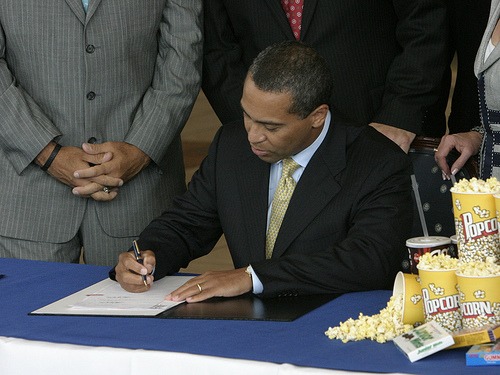
Local Industry | Massachusetts | Reports
Say Goodbye to Hollywood? Massachusetts Considers a Cap on Film Tax Credits
Written by Kerry O’Donnell | Posted by: Michele Meek
In an attempt to present a balanced budget, Massachusetts Governor proposes to cap the film tax incentives that have brought numerous big-budget productions to the state, created jobs and fostered local businesses.
[the_ad id=”26042″]
Massachusetts Governor Duval Patrick is currently faced with a 2.7 billion dollar structural deficit for the state’s 2011 budget. One of his proposed budget “fixes” is to cap the film tax incentives that the state grants filmmakers from its current 125 million dollars to 50 million dollars, and offer the incentives on a first-come, first-served basis.
There is strong opposition to Patrick’s proposed tax incentive cap, not only from members of the Massachusetts film community, but also from several media publications, such as The Boston Globe, The Boston Herald, The Lowell Sun and Banker & Tradesman. Massachusetts House Speaker Robert DeLeo has also publicly denounced the proposed tax cap.
The Massachusetts Film Tax Credit, enacted in 2006, provides a refundable (or transferable) tax credit for 25 percent of qualifying wage and non-wage production expenses and a sales tax exemption for qualifying in-state spending. Simply, what this means for filmmakers, is that for every dollar they spend in the state, they receive a 25 cent tax credit. Additionally, they also are eligible for a 100% sales tax exemption on any production-related items that are purchased in the state, from the start of pre-production and continuing for a 12 month period. Any production with a budget of $50,000 and over qualifies for these credits.
Proponents of the Governor’s tax cap cite statistics from the Massachusetts Department of Revenue as proof that the incentives are costing the state money. The Department of Revenue found that from 2006 to 2008, every dollar in tax credits that were generated by the program, the State of Massachusetts collected 16 cents in revenue.
But these proponents fail to cite the rest of the statistics from the DOR’s study that provides these financial breakdowns:
- According to the study, 36 percent of the total film industry spending, 247 million dollars, from 2006-2008, was on non-wage items.
- The largest categories were: location fees (56.8 million dollars), transportation (35.8 million dollars), fringe benefits (33.5 million dollars), hotels and housing (29.3 million dollars), set construction (27.2 million dollars) and food (17.7 million dollars).
When considering these dollar amounts, it is important to remember that this only represents the film activity in 2006, 2007, and 2008, when there was a total of 28 productions over that three year period. These figures don’t include amounts the film industry brought to the state in 2009, when the state hosted 14 productions, including The Fighter, Grown-Ups, The Town, Zookeeper, Furry Vengeance, and Knight and Day.
It’s also important to remember when discussing these projects that the actors and actresses in these films not only pay state income tax, but are also responsible to pay income tax on the residual income they earn from these films. This additional revenue isn’t documented in any of the Department of Revenues statistics.
Critics of the proposed tax cap cite many of the facts found in a study (Film and Television Production in Massachusetts: Industry Overview and Analysis) conducted by the University of Massachusetts and released on February 11, 2010 as proof that the tax incentives are working. Some of the study’s documented findings are:
- According to data from the Motion Picture Production Association, Massachusetts had the fifth largest growth rate among the most active 25 states in the country.
- From 2008 to May 2009, the state unemployment rate increased from 4.9% to 8%. During that same time period, motion picture production employment in Massachusetts grew by 117%, and post-production employment by 126%.
- The rate of job growth in the film production industry in the state has helped to offset the devastating employment losses in the construction and transportation trades.
- The tax credits have enabled commercial and advertising work to be made in Massachusetts for 30 to 40 percent less than New York City.
- The increase in film production has caused a growth in local equipment rental and specialized service firms. Local firms have expanded their inventory and national firms have also set up shop in the state.
- Massachusetts is home to several renowned university media production programs, including Emerson College, Boston University, Massachusetts College of Art and Design, Fitchburg State, Curry College and Bentley University. The increase in film activity has enabled many of these graduates, who would normally leave for Los Angeles or New York City to seek and find employment in the region, become income tax payers and home owners paying property taxes.
One of the study’s conclusions is that there are too many variables not considered in some of the Department of Revenue’s statistics. It suggests that the following, more generic method be used in order to get a more accurate picture of just how beneficial the tax benefits have been.
- Identify film activity that would not have happened without the credit. (This is referred to as induced activity).
- Calculate local direct spending (e.g. total local wages and non-wage spending) from induced activity.
- Calculate multiplier effects of direct spending using the IMPLAN or REMI economic analysis models. This direct spending includes induced economic activity, jobs created, etc.
- Add individual and corporate tax receipts to state from multiplier effects on wages and non-wages spending.
- Subtract direct costs to state in tax credits.
- Subtract negative multiplier of associated reductions in government spending.
In addition to Governor Patrick’s proposed tax cap, the Massachusetts film industry success is facing another assault from House Bill 3854 filed by State Representative Steven D’Amico. This bill was filed a year ago. D’Amico’s proposal would have a seven million dollar cap per production.
A hearing on the proposed bill is scheduled for Wednesday, March 3rd, at Room B-2, in the State House, beginning at 10:30 AM. The Boston area film community is rallying and predicts a strong turnout at the hearing in opposition of D’Amico’s bill. There is also a rally scheduled before the hearing, organized by Jodi Purdy, owner of South Shore Casting. The “Rally before the Rally” is scheduled for 9:30 A.M. at the Boston Common, on the corner of Beacon Street, across from the State House.
When a state enacts tax credits, for any industry, the purpose of the credits is not to generate immediate tax revenue, but future tax revenue. The goal is to attract that industry, and all the fiscal benefits that come with it, to the state. As that industry grows and becomes more economically successful, the tax revenues grow as well. Knowing this, it appears that the Massachusetts film tax credits are doing exactly what they were supposed to do.
For more information on industry response to this issue, see the or their Facebook page.
For more information on industry response to this issue, see the or their Facebook page.











